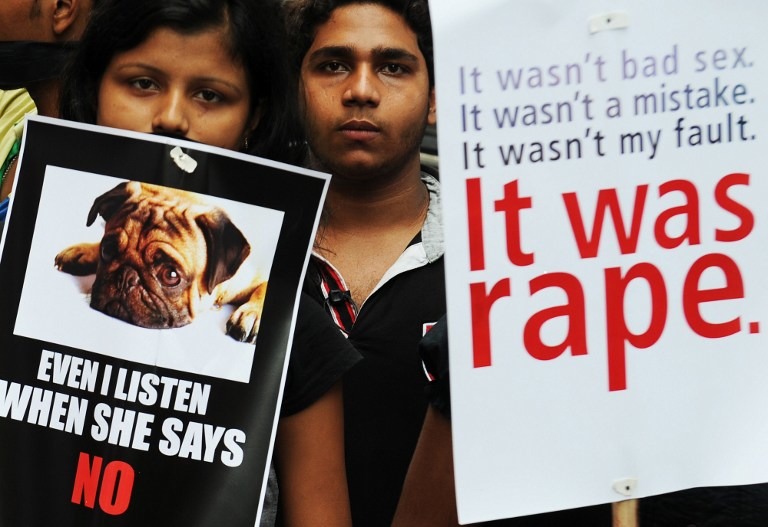SUMMARY
This is AI generated summarization, which may have errors. For context, always refer to the full article.

PARIS, France – The broadest study of its kind has exposed an entrenched culture of coercive sex among men in six countries of the Asia-Pacific, researchers said on Tuesday, September 10.
Reporting in the journal The Lancet Global Health, investigators pointed to startling evidence from interviews with more than 10,000 men in Bangladesh, China, Cambodia, Indonesia, Sri Lanka and Papua New Guinea.
Using a definition of non-consensual, penetrative sex as a benchmark, the probe said 11% of respondents reported having raped a woman who was not their partner.
This rose to nearly a quarter – 24% – when their partner was included in the question.
Of those men who said they had committed rape, just under half (45%) said they had raped more than one woman.
Prevalence varied widely between locations, though.
The highest prevalence of rape of a non-partner was found among respondents in Bougainville, in Papua New Guinea, with 27%; the lowest was in rural Bangladesh, with 3%.
The probe is not intended to be an authoritative statistical overview of rape in these six countries or of the Asia-Pacific region, say the authors.
Instead, it seeks insights into where sexual violence may occur, and the causes that drive it.
“In view of the high prevalence of rape worldwide, our findings clearly show that prevention strategies need to show increased focus on the structural and social risk factors for rape,” said the lead author, Rachel Jewkes of South Africa’s Medical Research Council.
“We now need to move towards a culture of preventing the perpetration of rape from ever occurring.”
By coincidence, the study was published as a court in New Delhi was to deliver its verdict in the trial of four men accused of the gang-rape of a 23-year-old student in a moving bus last December.
Her shocking death turned a spotlight on sexual violence, raising questions about what can prompt some men to accept rape or perpetrate it themselves.
Until now, such research has depended mainly on crime reports, which may be sketchy or skewed, or on accounts by women rather than by men.
Taking a new tack, trained male interviewers held lengthy one-on-one encounters with men in cities and the countryside, with the respondents gaining a guarantee of anonymity.
The respondents were not asked directly whether they had committed rape, but instead were asked questions such as “Have you ever forced a woman who was not your wife or girlfriend at the time to have sex?” or “Have you ever had sex with a woman who was too drugged or drunk to indicate whether she wanted it?”
They were also asked why they had done so.
Nearly three-quarters of respondents indicated reasons of sexual entitlement, saying for example, “I wanted her,” or “I wanted to have sex.”
Fifty-nine percent did it for entertainment, while more than a third – 38% – said they had raped a woman to punish her. Many said they had committed their first rape while still a teenager.
Other findings in the study point to potential causes and risk factors for rape, which in turn helps the search for solutions.
Men who had been sexually abused as a child or raped themselves were likelier to commit rape.
So were those who had a history of physical violence towards a partner, had paid for sex, were members of a gang, had problems with alcohol or had had a large number of sexual partners.
Rape was also more prevalent in places that had been theaters of conflict, such as Bougainville and Jayapura, in Indonesia’s restive Papua province.
Asked for an independent comment, Charlotte Watts, a specialist in rape research and a professor at the London School of Hygiene and Tropical Medicine, said the study was bold but thorough and the data was reliable.
“Commonly, much of the debate about violence against women focuses on the need to strengthen laws and provide services for survivors of rape. These are very important,” Watts said in an email exchange with AFP.
“However, that 30-percent or more of men in each country who reported having forced a woman to have sex had first done this by the age of 19 speaks to the need to challenge prevalent norms about masculinity and notions of sexual entitlement at an early age.”
Tackling alcohol use and childhood exposure to violence were other clear priorities, she said.
The study is one of two analyses from a data mountain called the UN Multi-country Cross-sectional Study on Men and Violence in Asia and the Pacific. – Rappler.com
Add a comment
How does this make you feel?
There are no comments yet. Add your comment to start the conversation.